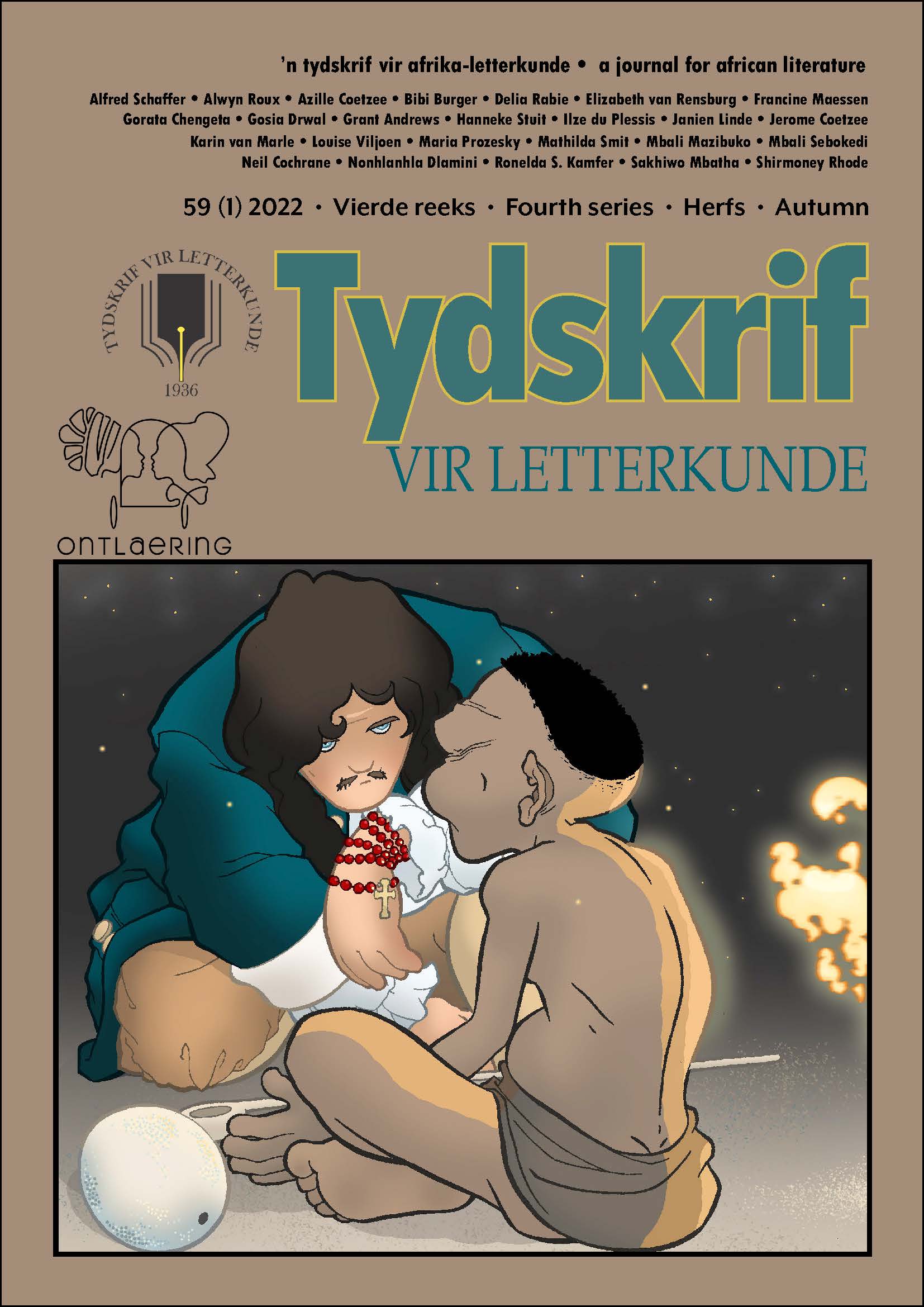Relasionele ontologie en posthumanistiese subjektiwiteit in Pieter Odendaal se poësiedebuut
DOI :
https://doi.org/10.17159/tl.v59i1.8977Mots-clés :
relational ontology, posthuman subjectivity , relationality, asof geen berge ooit hier gewoon het nie, Pieter Odendaal, Rosi Braidotti, Bruno LatourRésumé
In Pieter Odendaal’s debut, asof geen berge ooit hier gewoon het nie (as if no mountains ever lived here), the poet expands the complex question “re mang?” (who are we?) into an important theme and utilises it as a structural element by building the different sections of the volume around various conceptions of ‘us’. In this article, I argue that Odendaal’s poetry should be read in terms of relational ontology, seeing as relationality and interconnectedness are important themes in the text. The poetry creatively introduces a posthumanist way of looking at subjectivity and intersubjectivity. The text problematises the position of humankind on earth and in the larger universe, and asks questions regarding the basic ways in which we understand the concept of ‘us’, our existence and the ways in which we relate to every other inhabitant of the planet (human or non-human; living or non-living). In the process the Cartesian view of humankind is deconstructed and the human’s ontological position is decentralised. Everything on earth is placed on equal ontological footing as part of a never-ending network of interactions, associations, and influences. This kind of posthumanist and relational ontological thinking is foregrounded throughout asof geen berge ooit hier gewoon het nie. I analyse this foregrounding in poems which explore the following themes and topics: interpersonal relationships between people that experience life differently because of differing backgrounds (but also between family members and lovers); the relationship between humans and nature (in the broadest sense of the word); time, and the inevitability of finitude and death that connects everything; and the difficulty of dialogue aimed at finding justice, reconciliation, acceptance and appreciation, by means of a realisation of posthuman interdependence.
Téléchargements
Références
Benjamin, Herschelle. “Asof geen berge ooit hier gewoon het nie deur Pieter Odendaal: ’n resensie”. LitNet. 20 Sep. 2018. https://www.litnet.co.za/asof-geen-berge-ooit-hier-gewoon-het-nie-deur-pieter-odendaal-n-resensie/.
Braidotti, Rosi. “Critical Posthuman Knowledges.” The South Atlantic Quarterly vol. 116, no. 1, 2017, pp. 83–96. DOI: https://doi.org/10.1215/00382876-3749337.
Braidotti, Rosi. “Posthuman Critical Theory.” Critical Posthumanism and Planetary Futures, geredigeer deur D. Banerji & M. R. Paranjape. Springer, 2016, pp. 13–32.
Braidotti, Rosi. The Posthuman. Cambridge: Polity, 2013.
Estévez-Saá, M. & M. J. Lorenzo-Modia. “The Ethics and Aesthetics of Eco-caring: Contemporary Debates on Ecofeminism(s).” Women’s Studies vol. 47, no. 2, 2018, pp. 123–46. DOI: https://doi.org/10.1080/00497878.2018.1425509.
Felski, Rita. “Comparison and Translation: A Perspective from Actor-Network Theory.” Comparative Literature Studies vol. 53, no. 4, 2016. pp. 747–65. DOI: https://doi.org/10.5325/complitstudies.53.4.0747.
Felski, Rita.“Introduction”. Latour and the Humanities, geredigeer deur Rita Felski & Stephen Muecke. Johns Hopkins U P, 2020, pp. 1–27.
Ferrando, Francesca. “Posthumanism, Transhumanism, Antihumanism, Metahumanism, and New Materialisms: Differences and Relations.” Existenz vol. 8, no. 2, 2013, pp. 26–32. https://existenz.us/volume8No2.html.
Harman, Graham. Prince of Networks: Bruno Latour and Metaphysics. Re.press, 2009.
Harman, Graham. “The Importance of Bruno Latour for Philosophy.” Cultural Studies Review vol. 13, no. 1, 2007, pp. 31–49. DOI: https://doi.org/10.5130/csr.v13i1.2153.
Odendaal, Pieter. asof geen berge ooit hier gewoon het nie. Tafelberg, 2018.
Odendaal, Pieter, Naomi Meyer & Liné Enslin. “asof geen berge ooit hier gewoon het nie: ’n onderhoud met Pieter Odendaal”. LitNet. 25 Okt. 2018. https://www.litnet.co.za/asof-geen-berge-ooit-hier-gewoon-het-nie-n-onderhoud-met-pieter-odendaal/.
Taljard, Marlies. “Resensie: asof geen berge ooit hier gewoon het nie (Pieter Odendaal)”. Versindaba. 13 Sep. 2018. https://versindaba.co.za/2018/09/14/resensie-asof-geen-berge-ooit-hier-gewoon-het-nie-pieter-odendaal/.
Van der Merwe, Joanette. “Notes Towards a Metamodernist Aesthetic.” Proefskrif. Noordwes U, 2017. http://hdl.handle.net/10394/25443.
Van der Tuin, Iris & Rick Dolphijn. “The Transversality of New Materialism.” New Materialism: Interviews and Cartographies, geredigeer deur Rick Dolphijn & Iris van der Tuin. Open Humanities, 2012, pp. 93–113.
Viljoen, Louise. “Asof geen berge ooit hier gewoon het nie.” Tydskrif vir Letterkunde, vol. 56, no. 1, 2019, pp. 154–7. DOI: https://doi.org/10.17159/2309-9070/tvl.v.56i1.6306.
Téléchargements
Publiée
Numéro
Rubrique
Licence
(c) Copyright Tydskrif vir Letterkunde 2022

Ce travail est disponible sous licence Creative Commons Attribution - Partage dans les Mêmes Conditions 4.0 International.


 https://orcid.org/0000-0001-6465-6584
https://orcid.org/0000-0001-6465-6584


.png)